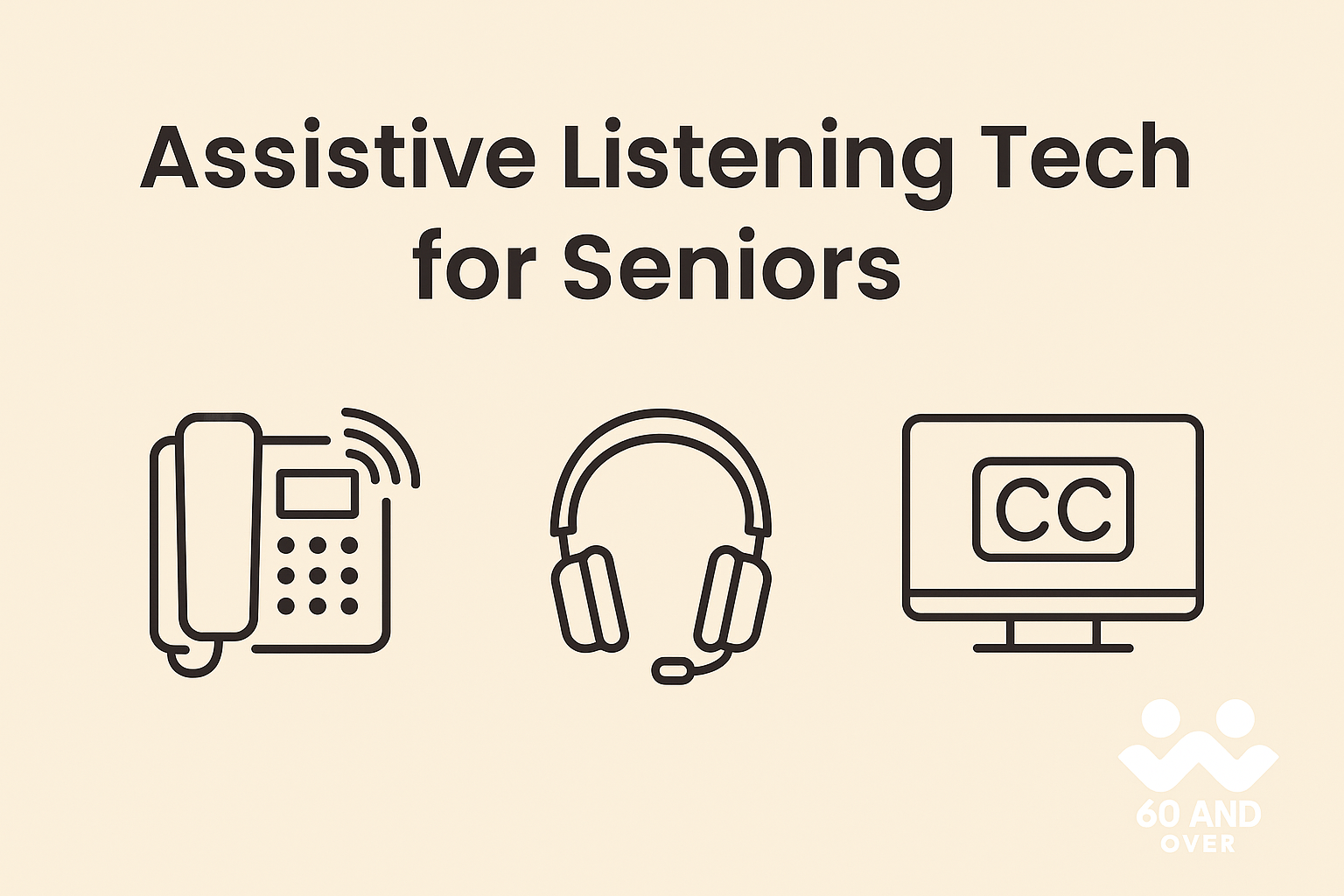Introduction: Hearing Help Beyond Hearing Aids
For many older adults, hearing loss is not just about volume — it’s about clarity. Words may sound muffled, TV voices may blur together, or conversations in restaurants may feel impossible to follow. While hearing aids remain the most recognized solution, they are not the only option.
Assistive listening technology (ALT) provides tools for everyday challenges. These devices don’t always require a prescription and often work alongside hearing aids or even without them. For seniors who want to stay connected, safe, and independent, ALT can be a game-changer.
Why Assistive Listening Matters for Seniors
Untreated hearing loss is linked to social isolation, depression, and even cognitive decline. When conversations become frustrating, many seniors simply withdraw. For caregivers, this withdrawal can feel like personality change when, in reality, it is a response to the stress of not hearing well.
Assistive devices provide:
- Confidence in daily communication – Whether it’s a phone call with a grandchild or understanding the doctor’s instructions.
- Safety in emergencies – Being able to hear alarms, phones, or visitors at the door.
- Freedom to participate – From church services to community meetings, technology ensures seniors don’t miss out.
The impact goes beyond convenience — it’s about preserving dignity and quality of life.
Everyday Assistive Listening Technology
Amplified & Captioned Phones
Standard phones may not offer enough volume or clarity for aging ears. Amplified phones boost sound significantly and often allow tone adjustments to highlight voices.
Captioned phones add another layer by displaying spoken words on a screen. This dual input — hearing and reading — reduces miscommunication and frustration.
Caregiver insight: Captioned phones can be especially valuable for seniors living alone, ensuring they don’t miss important details in medical or financial conversations.
- Unmatched Accessibility and Convenience: Hamilton CapTel empowers people with hearing loss by…
- REQUIREMENTS: 1) High-Speed internet (Ethernet cable or Wi-Fi). 2) Telephone Service – Can be…
- Customized Communication for people who are Hard of Hearing: Enjoy the intuitive interface that…
- 24/7 Nationwide Captioning Service, available at no cost. Experience the freedom of connecting…
TV Streamers & Wireless Headsets
Television is a major source of entertainment and connection, but it often becomes a battleground. Seniors turn up the volume, while family members find it too loud.
TV streamers and wireless headsets solve the problem by transmitting sound directly to headphones or compatible hearing aids. This means seniors can enjoy programs clearly without disturbing others.
Some devices even allow independent volume control, so everyone in the room hears at their preferred level.
- Private Watching Experience: LEVN wireless Headphones for TV are designed to provide a private,…
- Low Latency Audio: Our TV headphones wireless feature Bluetooth 5.2 technology and offer…
- Plug and Play: Simply plug the audio cables into the ports on the transmitter and TV and power…
- Reliable Companion: Experience unwavering reliability with our wireless headphones for TV that…
Personal Voice Amplifiers
In noisy environments or group settings, seniors may struggle even with hearing aids. Personal amplifiers are pocket-sized devices with a microphone and earbuds or headphones.
The speaker’s voice is captured and delivered directly, reducing background noise. These are helpful in settings like churches, lectures, or even family gatherings where multiple voices overlap.
- SUPERIOR PERSONAL SOUND AMPLIFIER: Applying noise cancelling, automatic gain control and…
- 3 TYPES OF REMOVABLE MICROPHONES: Joanbro sound amplifiers for seniors feature 3 types of…
- TACTILE TONE CONTROL & VOLUME CONTROL: Joanbro sound amplifying enhancer is designed with an…
- COMPLETE AMPLIFICATION SYSTEM: This powerful sound amplifier includes a belt clip,…
Loop Systems & Public Venue Tech
Many public spaces now use hearing loop systems. A loop wire installed in the building transmits sound directly to hearing aids or receivers.
For seniors with hearing aids equipped with a telecoil (T-coil), this means crystal-clear sound without background noise. Theaters, airports, churches, and auditoriums often list “hearing loop available” signs — though many seniors don’t realize their aids already support it.
Caregiver tip: Ask an audiologist to activate and explain the telecoil function. Many seniors have the feature but don’t know it exists.
Smartphones & Accessibility Apps
Modern smartphones come loaded with accessibility features:
- Live captions – Converts spoken words into text on the screen.
- Sound amplification apps – Turn the phone into a microphone that streams to earbuds.
- Direct hearing aid pairing – Many Bluetooth hearing aids sync directly with phones for calls, music, and video.
Apps are often free or low-cost, making them an accessible entry point for seniors hesitant about other technology.
Choosing the Right Technology
Consider the Environment
Before choosing an assistive listening device, it’s important to match the solution with the setting where hearing is most difficult. Some seniors struggle most in quiet, one-on-one conversations, while others find busy restaurants or social gatherings overwhelming. Those who miss dialogue while watching television may benefit most from a TV streamer, while socially active adults might prefer personal amplifiers to boost clarity in group conversations.
Check Compatibility
Assistive listening tools aren’t one-size-fits-all. Seniors who already wear hearing aids should look for devices that connect directly, whether through Bluetooth, telecoil loops, or direct audio input. Compatibility ensures the device works seamlessly without constant adjustments or technical frustrations. This makes the investment worthwhile and reduces the risk of abandoned technology.
Prioritize Simplicity
The best devices are those that seniors actually use. Technology should empower, not intimidate. Devices with large, easy-to-press buttons, bright displays, and clear instructions reduce stress and make daily communication smoother. Minimal setup and straightforward functions ensure the device becomes a helpful companion instead of a burden.
Balance Cost and Benefit
Not all devices are expensive. Some amplified phones are under $100, while advanced systems may cost more. Caregivers should match solutions to needs and budgets without assuming “more expensive” is always better.
Real-Life Scenarios: How ALT Changes Daily Life
- Mary, age 72, avoids phone calls with her doctor because she misses key details. A captioned phone restores her confidence and reduces anxiety.
- Robert, age 78, struggles in church despite wearing hearing aids. A personal amplifier helps him follow sermons again.
- Linda, age 80, watches TV at high volume, straining family relationships. A wireless headset allows her to hear clearly without disturbing others.
In each case, ALT prevents isolation and promotes independence.
Caregiver Note
Caregivers play a key role in choosing and setting up assistive technology. It’s common for seniors to feel hesitant or embarrassed about using devices at first. Gentle encouragement, demonstrations, and troubleshooting support often make the difference.
Remember: ALT does not replace medical care. Seniors with hearing concerns should still see an audiologist for a full evaluation. These devices are most effective when used alongside professional guidance.
Resources for Families
Families can find more support through:
- Alzheimer’s Association – For those balancing hearing loss and dementia care.
- AARP Hearing Resources – Practical guides and product comparisons.
- Local senior centers – Many host hearing screenings and technology demos.
Conclusion: A Bridge to Independence
Assistive listening technology gives seniors the tools to thrive in everyday life. From reducing isolation to improving safety, these devices close the gap between what hearing aids provide and what seniors truly need to stay active and independent.
By exploring options like amplified phones, TV streamers, and personal amplifiers, families can tailor solutions that fit lifestyles and budgets. The result is more than better hearing — it’s restored confidence, stronger connections, and peace of mind.
Frequently Asked Questions
Q: Do assistive listening devices replace hearing aids?
A: No. These devices are designed to support or extend hearing in specific situations, such as phone calls, TV watching, or group conversations. Hearing aids address overall hearing loss and should be guided by an audiologist.
Q: Are assistive listening devices easy for seniors to use?
A: Many are designed with seniors in mind, featuring large buttons, clear displays, and simple controls. The key is choosing products that match the senior’s comfort level with technology.
Q: Will Medicare or insurance cover assistive listening devices?
A: In most cases, Medicare does not cover these devices, though some supplemental plans or veteran benefits may help. Affordable options are available on the market without a prescription.
Q: Can these devices improve communication with family?
A: Yes. Amplified phones, captioned phones, and TV listening systems reduce frustration and help seniors engage more fully in conversations, strengthening family and social connections.
Q: Where can families find assistive listening devices?
A: Options are available online, at hearing clinics, or through senior-focused retailers. Always check product reviews and ensure devices are compatible with any hearing aids already in use.
Explore More from the Hearing & Vision Hub








